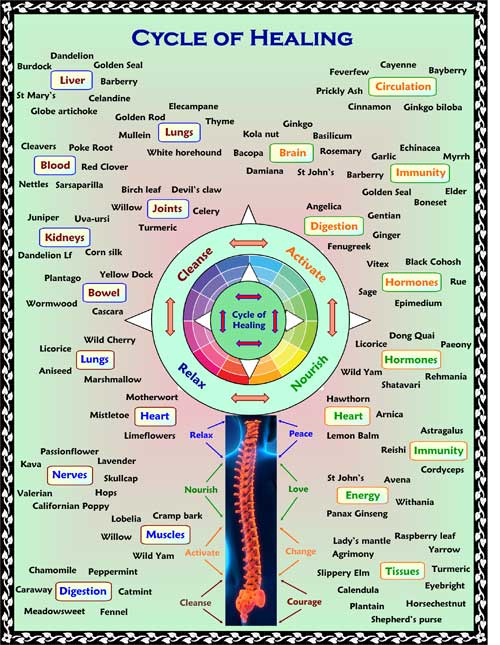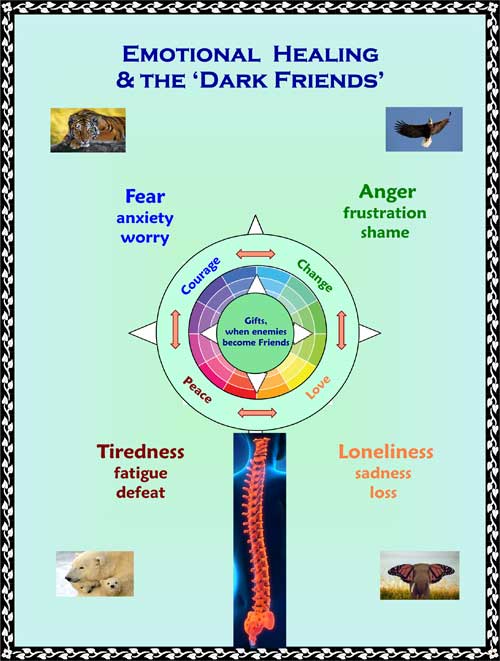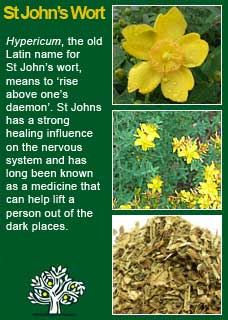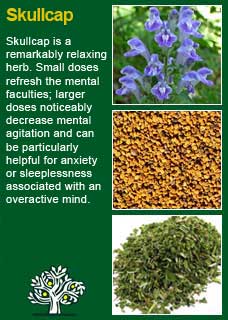
|
|
||||
| Our Pages ABOUT CONSTITUTIONAL MEDICINE
|
Used wisely, a holistic approach that includes herbal medicines can be exceptionally helpful for depression, even in very severe cases as has been frequently seen. Herbs have been humankind's only medicine for virtually our entire evolution so of course we found allies in the natural world to help us with our darkest moods and our deepest pains. No-one should have any doubt that these troubles have been with a great many of us since our collective journey began. I've been in full time practice in Christchurch, New Zealand since 1989 and, like everywhere in the world, there are many people who are struggling with depression here. Whilst each case is different, there is also much common ground between people and there are some general suggestions given here further on that may benefit anyone. Firstly however, from the clinic files, the following two case histories are shown to illustrate some individual approaches to this complex and most troubling condition.
I first met Angela when she was 29 years old. She had begun to experience early signs of depression at a very young age, 13 or 14, and by the time she was 16 was so deep into it that she felt unable to cope, developed suicidal ideation, and was put on medications that she had been on almost ever since. She had tried stopping medication twice but both times had rapidly crashed and said she felt ''absolutely disgusting'. She was terrified of trying to come of them again but was still conflicted about needing to be on medication for life and, because her aunt had a good result from coming to see me for something else, and had recommended Angela to come and meet with me, she came in. When asked about her general life she said it was 'going ok' but she had never been in a serious relationship and was in a boring job just to pay the bills. She said she had a good circle of friends but that most of them were now in relationships and she only caught up with them occasionally. She made herself go to the gym a few times a week but didn't have any hobbies or interests and said that, apart from the gym, she felt too tired to make an effort to do much after work. In her words she said, 'my life is totally boring, and I don't enjoy anything anymore'. When asked what her main challenge was in terms of her health or how she felt, she said, I just feel tired all the time'. This is often the picture of medicated depression, people go into a kind of limbo, they pay their taxes, they are docile, but they can be terribly, awfully stuck. We had a long talk about what would be involved if we were to start treatment and work together, this is discussed in depth in the next section on her 'work' but firstly these are the herbs we used to let Nature in to lend a hand.
We make our own tinctures from organic dried herbs, so it might be important that you understand that the optimal dose range will vary with different preparations made by different companies or practitioners, The above liquid extracts were combined into a formula to make 540mls. This will just fit in to a 500ml amber pharm round bottle and is enough to last 4 weeks if taken at the maximum safe and effective dose of 10mls twice a day, which is what we used. These are some of the most important herbs in Nature to nourish and strengthen the nerves. None of them are anti-anything. They don't stop a person feeling or thinking, their method of helping is subtler and, at the same time, strangely more far-reaching. People commonly go through a deep process of internal change when they take medicines like these. There is a palpable support from Nature that enters into the picture, that sees them moving onto a healing journey that they would never embark on without the influence of these potent allies. Each herb works in its own unique way but combining them into a formula like this gives a better result than could be achieved by using them individually. Any of the herbs can be learned about in more depth in the Herbal A-Z found here Hawthorn & Reishi capsules At a dose of two capsules, twice a day. We get dried, concentrated extracts of Hawthorn berry and Reishi mushroom and send them to a local company to be processed into capsules. Hawthorn is the great remedy for strengthening the heart, and no-one should ever think that depression only affects the mind, Reishi has its own far-reaching effects on the nervous system; calming and nourishing. Tonic Tea & Relaxing Tea These pleasant and inexpensive tea blends were for her to use freely with one or more cups a day as she preferred. Again, these herbs were used to support and strengthen her healing journey, rather than to fix or correct anything. The recipe and instruction for the Tonic tea is here, the Relaxing tea here
The first step in healing is the one in which we let Nature in. Where these ancient allies, these herbs, can support and help us. The first step for Angela was simply to take the prescription as shown above. The next step is what I call the 'work'. It is what the patient does to help themselves. Underlying all the old ways of healing is an understanding that living organisms have the innate ability to self-regulate and resolve their injuries or sicknesses, unless something is getting in the way of that built-in, self-repairing intelligence. The 'work' is usually about doing something to remove whatever is obstructing that natural force, and this principle applies every bit as much to matters of the mind or heart as it does to matters of the body. However, because each case is unique, to get a sense of what the 'work' might be, as a practitioner you must have an open mind, which means asking open questions and carefully listening to the answers. As much as the conventional system, with massively invested pharmaceutical corporations behind it, would have the populace believe that depression is simply a chemical imbalance needing life-long chemical adjustment, the truth is very different, and perhaps much harder to accept. I've met with, and worked with, a great many people with depression. In every case, without exception, when I've asked open questions and listened carefully, there has always been good reasons for the dark moods, or the break-down, or the loss of joy, energy or motivation. The roots of things are usually found by going back to the beginning of them. Angela went through something, very early and very badly, that most teenagers must eventually experience. It was a crisis of identity, where her self-image went through a radical change and she did not adapt at all well to it. Deep in the roots of her negative emotional state was an underlying dysmorphia (an overly negative body image that is not reflected by the reality of how she actually looked. Unfortunately, she had not received the guidance and support she needed when entering puberty to adapt to the massive changes happening in her body and she had never become comfortable with herself as a mature, sexually activated human being. Her clothing and the way she presented herself showed a person who wanted to hide from the world than show herself. Years of dieting and working out at the gym had never made her slim enough and she obsessed about her weight even though there was nothing whatsoever wrong, unhealthy or excessive about her current weight. There is more to this, for example about the family relationships that underlined why she was so unsupported at that critical time, but these are the broad strokes to give you a sense of the physicality of her emotional state. We tend to talk about depression as if it were a state of mind, but it is every bit as much a state of being at a physical level. In many people who are in depression, this 'physicality' manifests as high levels of tension and anxiety. In Angela it was in her constant tiredness and in feeling a deep and constant displacement in her own body; she was rejecting herself. If we had been able to go back in time, and if the hurting, younger version of herself had the language to express how she was feeling, she wouldn't have used the word 'depressed', that name came later with all its many associations, rather she would have said things like she had a pain inside, that she felt lonely and alone, that she was scared, and that she didn't know what to do. The deep roots of depression start, in many people, from a feeling of isolation. From having an internal pain that cannot be seen, touched or understood by anyone else, or at least so it seems. A young person doesn't usually have the language skills, or the artistic freedom to express how they feel, so they are much more likely to show it in their actions. This usually takes one or more of a number of forms such as; physical isolation, withdrawal, self-harm, self-denial of food, friends, comforts etc. When we are in pain, and assuming there is someone around us who we think might care for us, we try to express our pain in some way. It is simply human, we need the solace of another person's understanding and acknowledgement of our pain. However, if there is neither understanding nor acknowledgement to be had, we go further into isolation and loneliness, and a feeling of sadness, of depression, can come to stay. Angela was an EB, an Elephant/Butterfly constitution, I will say something about that later, and she mostly needed help with the 'relaxation' and 'nourishment' phases of her healing cycle, more about this further on too, for now the key point is to understand her 'work' which began with relaxation. For this she firstly had to allow herself to rest and sleep as much as she needed to and then, secondly, do at least one thing a day that could trust de-stress and relax her to at least some extent. It is usually a most potent intervention for a person who is in stress and fatigue to stop resisting it and to allow themselves to rest and relax. Even though their whole being, their body and mind, have been crying out for more sleep and rest for years, people fight against their tiredness as if it were their worst enemy. However, if they don't turn towards their tiredness as a friend, allowing it to guide them and take them where they need to go, they can remain caught in illness indefinitely; physical or emotional. It is equally life-changing for a tired, tense person to do something that relaxes them on a daily basis but, given how obvious this advice must seem from the outside, you cannot imagine how much resistance a person in stress can put up to sustaining a relaxing activity day after day. Even if they agree with the idea in principle, and understand how necessary it is to get better, they will find any excuse to put it off because they think they have to solve the problems that are making them tense before they can relax. I trust you see the paradox. However, setting an intention and following through on it can change even the most 'hard-wired' conditioning, if the person so chooses. I warned Angela to be prepared to get worse before she got better, to feel more tired even when she ws resting and sleeping more, and that she was not to go back to the gym until she had gone through this stage. When a person has been 'tired and wired' for a long time, and they start to rest and relax, they usually go through a process where, as soon as they start sleeping more and resting more, that they feel even more tired. If you don't know to expect it, it can trigger anxiety that everything is getting worse and that there won't be any end to it, though there always is. I want to put a note here for anyone reading this who has 'anergic depression' where they are already sleeping a great deal and aren't particularly 'wired' that this approach that we used for Angela would not be called for, or helpful. Like I said, each case is different. On the second visit, Angela reported that she had done everything as directed, and had experienced a week or the most profound fatigue in the beginning, but that her general energy and well-being had much improved since then, and that she was feeling more optimistic about things in general. Her relaxing activity was craft-work and there was a clear sparkle in her eyes when she talked about it. That first restorative phase of rest was essential for Angela to be ready for the 2nd stage of her 'work'. The herbs she had been using were already some of the most supportive of all the remedies in Nature, and now she had to align this with attention to the great 'nourishment' phase of her cycle of healing. Before I go on to explain what this entailed, I should mention that a herbalist must also be prepared to be a dietician, an exercise-coach, and a counsellor. To work holistically, you must be able to meet the patient wherever they are on their healing journey and to have an extensive tool-kit of ways and means to be of service. After all, all that matters, whilst not doing harm, is to get as good a result as possible as quickly as possible. Her 'work' in the nourishment phase was twofold. Firstly, she had to perform a daily practice of closing her eyes, centering into her heart and belly, and asking her body, her inner self, the question 'what do i feel like eating today?' This is a deeply transformative process, so long as a person will commit to it, which again can come up against a lot of conditioning and resistance when a person has been long used to putting their needs aside. It is fascinating what kinds of foods a person comes up with when they start making this enquiry. With few exceptions, they are almost always healthy choices but often include quite different foods than the ones the person was simply eating out of habit and routine. The second great challenge was for her to enlist the support of a close friend to help her go through a physical makeover; clothes, make-up, hair-style, everything. Of course, this would depend on Angela having savings, which she did, and most vitally, having a true friend in the picture who would be ready and willing to help, which thankfully there was. I asked and received Angela's permission to call this friend (after she had a chance to warn her there was a call coming!) to discuss with her directly what the intentions of this were all about. It was my hope that not only would she be happy and willing to help Angela with the 'makeover' but might also help her get out into the world again as well. I mentioned how Angela's manner of dress, speaking etc. showed a young woman who had very low self-confidence and had long been trying to hide herself away so perhaps you can imagine how challenging a prospect this was for her. To get a new wardrobe, a new hairstyle, new make-up, and to work on her posture (some simple guidelines were given here) and to most importantly to set an intention to embrace her femininity and to have the normal, natural desire to look beautiful and to be seen as attractive by others. I remembered Angela's case to share, not because her depression was worse than hundreds of others I have worked with, but because she had such great courage to embrace all of these challenges so whole-heartedly and because she improved so quickly! Sometimes the healing journey is long, no matter what you do, but my goodness it's great when it's fast! The speed and depth of the transformation of Angela's inner experience and her whole manner of being in the world was striking to say the least, and very memorable. Without needing to unearth things to any great degree, just by acknowledging the roots of what had gone wrong and recognising the power of some simple steps to remedy those wrongs, she healed something that had been broken since she was a young woman. I only had one further visit in my clinic from Angela, where she announced to me that, along with going out with friends and actually having some fun, she was now completely drug free. I never push my patients to take this step, but when they are ready to stop I believe that they certainly can. She said she had gone through some withdrawals of feeling really weird for about a week and then was fine, albeit her emotions felt a lot rawer and everything seemed more vivid. I put Angela in charge of her treatment, meaning she could decide when she was ready to stop everything and to listen to her body and to come back and get more if she ever wanted to. Likewise, to come and see me again if she ever felt she needed to. As it happens I did meet Angela again, several years later, and only by chance when out in public. Christchurch is not so big a city that I don't often see patients when I am out and about but, of course, I always respect their privacy and even, unbeknownst to them, certainly do not go about retrieving my internal files on who they are and what they came to see me for! However, Angela herself came up to me to tell me that she was now a mother of a 6-month old boy, at home with his dad. She was obviously doing incredibly well, and she looked absolutely beautiful. It was a joy for me to behold her happy, smiling face and to see that inner strength and courage of a person who has faced their darkness and come into their light.
I chose Angela's case to share because, as well as demonstrating some core strategies, it was so successful, and she went through such a major transformation. However, there is another category of patient that you remember because their condition was so bad or because they were so hard to help; Robert was both of those. I first met Robert when he was 52 years old. He also had experienced patches of 'the blues' since he was a teenager but nothing terribly severe until he was in his late 20s when his first major bout of depression came about. He battled through it, as Kiwi (New Zealand) men, and men from most cultures, tend to do, and eventually came right after what he described as a total withdrawal from everyone and everything. The following decades saw Robert pursue some fairly high-level career goals, and he was clearly an intelligent and capable person with plenty of ambition but, he described a pattern whereby, as he ruefully recounted, especially when things were going well, that he would feel the walls closing in on him, he would fall into a black pit and would revert to wanting to escape it all. In his 30s he had two periods where things got so bad, and he got so alarmed that he was about to do himself terrible harm, that he had himself admitted to the Christchurch psychiatric hospital. All the usual drug therapies had been tried, including the new ones as they became available. He had used antidepressant drugs on and off for almost all of his adult life but didn't feel any of it made much difference. By the time we met, there were deep lines etched into his face and the heaviness in his presence and voice of a man who had fought too long and lost too much. Less than two years beforehand, his wife of over 20 years had said she couldn't take it anymore and had left him, or it might be more accurate to say that she asked him to leave, because she remained in their family home with their two teenage daughters whilst he moved into a rental where he never had the girls come over, or anyone else for that matter. Without being asked, he said he no longer wanted to 'do himself in' but that he really couldn't see the point of anything anymore. He had almost completely cut off contact with his family and all but one friend. He had a job that occupied most of his daylight hours, ate what he called a 'bachelor diet' and occasionally went out for a walk. Physically, he was very overweight and said he felt sore all the time but just ignored it. Robert was a deeply unhappy man. You might be familiar with the 'thousand-yard stare' something people get when they have seen a lot of trauma. Robert had that look, there were no smile lines around his face; he had been in a bad way for a long time. On careful examination of his pulse and tongue (more about this ancient art here for anyone interested). I felt there was something important he was missing so, once we had established some rapport and he was opening up more easily, I asked him if he was using any mind-altering drugs or if he was using alcohol more than he thought might be good for him. The answer was 'yes' for both. He used to use harder drugs but now still smoked marijuana every day and drank between one and two bottles of wine most nights. The 'one friend' I mentioned above was the one who had made Robert promise to come and see me. I should also mention that Robert was from the Tiger constitution, hotter and damper, and again this subject will be introduced in more detail later on. I think it is fair to say that Robert did not come in with any real expectations, he was doing it for his friend but, to his credit, I believe he also came with an open mind and was willing to hear what I had to say. With someone like Angela, maybe from their youth, but also just from who they were as a person, you can jump in the deep end from day 1. With someone like Robert, it is very much a step by step process if you will have any chance of getting any kind of lasting, tangible result. We'd had a good chat, and he'd been very honest about everything. I told him that I would be happy to do anything I could to help but that I wouldn't want to even begin unless I had his promise that he would do everything in his power to do 'the work'. and that before he could decide about this that I would do my best to explain exactly what that could entail. The 'therapeutic relationship' is just that, it is a relationship. It can empower people to make changes that they might never be able to do by themselves, but it greatly depends on there being a great deal of trust and honesty on both sides. Robert had to be ready to 'clean up', this meant his diet but also his addictions. I explained that, if he wasn't ready, if he hadn't hit rock-bottom yet, that there would be no charge for having a meeting with him today (once any amount of money, or some other symbol for it, exchanges hands then the relationship is formalised, and we move forwards with our respective obligations) and that it would be entirely up to him to come back if and when he was ready. When you put it like that to a person like Robert; and they get it, that there is nothing but the desire for healing and so a need for a total readiness on both sides to do whatever it takes to get well, you will often see the exact moment that something shifts behind their eyes. It's like a tiny flame off hope gets born in the midst of all that cynicism and hardening of the heart. Hope is a very precious thing, without it we fall prey to despair and inertia. 'Yes' he said, 'I'm ready'
These are some of the most effective herbs in Nature to bring about a deep, cleansing action in the body through their work on the liver, the kidneys and the blood. Again, to note that these are all our own tinctures, so you must understand that the dose range would vary with other products. Here the formula makes 540mls, just able to fit in a 500ml bottle and would last 4 weeks when taken at the maximum dose of 10 mls twice a day.
Two capsules, twice a day. I nearly always use a highly concentrated extract of St Mary's thistle when doing such a potent cleansing program of herbs and diet. St Mary's protects the liver cells from the increase in waste products that will start flushing the blood. It also, remarkably enough, is well established to help the liver regenerate its own damaged tissue.
Four capsules, once a day, in the morning. These are two of the most renowned and best proven herbs to lift energy and vitality. In another case, I might have used them in the second stage, after we had done the cleansing program. In Robert's case, it was all hands-on deck. If we were going to get to a second stage, let alone the much longer journey he needed to take to get well, he needed to get some tangible benefits from the beginning.
Four capsules, once a day, in the evening. These herbs were to help him to relax, unwind and get a good night's sleep. They are frequent allies in the treatment of depression because they help the mind and body to better heal themselves in rest.
Essentially, at least at first, Robert's 'work' was to clean up his diet. For another person, perhaps someone that was already eating well, this would not seem like that big a deal. For another, perhaps in the depths of despair, their diet might seem like a practical irrelevance and that would certainly have been true of Robert's point of view. It might not have been important for some people, it was vitally important for Robert. As we began to talk further about cleansing and why we needed to start there, the story came out further and made a lot of other things clearer. There was a pattern of Robert getting clean from his taking drugs and drinking, getting ahead in his life, getting fit, making savings etc. and then falling back into drugging and drinking and going into a steep decline into a depressive episode. Apparently, the main reason given for the marriage break-up from his wife was that she just couldn't stand by and see him ruin his life again and had warned him that it was a choice between her and the substances. Robert had downplayed this to everyone, including his doctors, including his friend, but at least he wasn't denying it to himself. So, cleansing was the first priority in this particular case. This is the art of the old ways of medicine. You cannot prescribe one approach to all people with the same problem. You have to get alongside them, understand where they are at as well as the journey they are on, and then seek to give the best support and guidance that you can. Each case is different. For Robert, who had stopped caring about his food long ago, not only taking a total break from mind-altering substances, but eating a healthy diet was a huge challenge. No doubt made worse by the added condition that he had to keep a written record of everything he ate for an entire month! Of course, this was a dreadful imposition, which I would have apologised for, and would also have told him how aware I was that 'the road to hell is paved with good intentions'. Without his keeping a record, and a sense of obligation that he would have to show it to another person in a month, he mightn't have made it a week. Robert came back a month later with a quite different countenance. Previously, he had mostly looked at the floor, now he was looking me in the eye. He still looked as grim as an undertaker, but you could feel that he had found some steel inside him that had not been there for a long time. He had slipped up with the drinking and smoking a few times but had written it all down and was completely honest about it. More importantly, he had made an enormous effort to eat clean, healthy and whole foods. You simply cannot overemphasise how much of a difference a good diet can make to a person's mental health; it's huge. By the way, the cleansing diet that he did is written up here We used the cleansing program for another month whereupon we dropped the liquid formula and the St Mary's thistle capsules but carried on with the other capsules for quite some time. It was entirely voluntary on Robert's part as to how long he kept using these three herbal capsules and, whilst he was always taciturn about it, he obviously wanted to stay on them. On his own initiative, he had stopped taking his antidepressants near the beginning of the cleansing program and was obviously glad to be off them. I mentioned at the beginning of this that I picked Robert's case as a tough one and also said that it was vital for us to have made a strong and positive beginning because he had such a long journey ahead. 'Cleansing' was just the beginning of it. Many patients only need to come in 2 or 3 times but some, like Robert have a much bigger mountain to climb. I talked about the 'roots' of Angela's depression being in her early adolescence, Robert's were more within his 'Tiger' nature to need a sense of purpose to fulfil his inner drive. He could see that it was all the times in his life that he had begun to drift that he was drawn into using mind-altering substances as a way of escaping what, in effect, became an inertia of achieving goals that weren't really his to begin with. He was too smart for his own good. He initially thrived on the challenge of a new job, a new role, right up until the point that he mastered it, whereupon he would begin to find fault with the job, the company, the world he was in, so he would set about breaking it all apart. The first major internal shift that happened when he 'cleaned up' was that he began to seriously lament the loss of his family and wanted to do something to win them back. It was a laudable goal but, not knowing if I should support him in in it, I asked him for his permission to call his ex-wife to discuss his case. I needed to know if there was any possibility that she might be ready to consider a reconciliation or if the door was completely shut. Unfortunately, despite asking her some very open questions to see if there was any hope at all, there was truly none. It was an awful thing to have to tell him, but he would have spiralled back into self-destruction if he had pursued this path again. I certainly encouraged him to renew his relationship with his daughters, which he did, but Robert needed to find a new direction, one that would positively challenge him and allow for the kind of future growth that would not end him up in the same place; disconsolate, unfulfilled, self-destructive. We also talked about him being open to finding a new love in his life, that this would certainly help him a great deal in the long run, but that even before putting himself out there, so to speak, that he had to find his way and know that he had tamed his 'black dog' (as Winston Churchill famously called his own depressive episodes) Earlier, I said about herbalists equally needing to be dieticians, exercise-coaches and counsellors, in Robert's case, being a business-mentor became part of the job description too! Not because I would know which end was up of a spread sheet but because what Robert needed above anything else was to follow his own dreams and work for himself. He had wanted to do something like this for his entire adult life but had always found a reason not to do it. He told himself, and others, that the reason was always a financial one, but the truth was that he was afraid, and such is the nature of fear to make us freeze when we should act. To face his fears and to take such risks as this involved was a much greater challenge than cleaning up his diet, it challenged him on every level, mentally, physically, emotionally, and financially, at least for a while. To Robert's great credit. he faced those fears and, not without numerous set-backs, began to achieve what he had set out to do. I won't say what the business was. I have asked his permission to share his story and I ran all this past him before putting it online. He's actually really proud of what he has achieved but we agreed to change his name too, because he has become rather well-known in the business he made his own, In fact, all that work we did together was several years ago now and I haven't personally seen him in a long time. When I called to check that I could share parts of his story, he told me that he was in a new relationship and that he'd never been happier. Robert was always kind of a tough guy, he would talk about his suffering as if it happened to someone else, and to be honest I expected he would prefer I didn't write about him but, not only did he certainly want me to do it, but he finally said some things to me about what working with me had meant to him at the time and, well I don't need to go into that further, but I will confess that I might have got something in my eye by the end of that call. It was good to hear.
I mentioned above that Angela was an EB and that Robert was a Tiger. This ancient way of understanding our differences, according to how we are naturally either hotter or cooler, and at the same time dryer or damper, underpins much of the approach to what kinds of foods, herbs etc, will best help a person. Anyone, from any of the constitutions, can get depression, it is part of being human. If you, or someone you care for, are having troubles in this area, you can learn more about the general subject of the constitutions starting here, and then work out which constitution you or they are by going here
After getting a sense of whether a person is naturally cooler or hotter, dryer or damper, the next level of knowledge to take the kind of personal approach that can be essential to a great result is to look into the healing cycle. This is a fascinating subject in itself and understanding it can give great insight into what needs to be done to treat the cause and help healing happen naturally. There are four stages in the cycle; cleansing, activation, nourishment and rest. the cases above showed how rest and nourishment were vital to Angela's healing journey and how cleansing, and then activation in terms of finding his life-path, were essential to Robert getting well. One person with depression might need to rest and relax before they can move forwards, another might need to start activating and exercising before they can make any significant head way. One person might need cleansing, another need nourishment. I hope you can see how these needs are so divergent and how important it is to take an individual approach to get an excellent result. However, before I put the link for anyone who wants to learn more, I want to say that I fully recognise that many people are not ready to take the kinds of steps you see being talked about in the case histories above or in the general recommendations below. They would rather use prescription drugs and get on with their lives with as little disturbance to their habits as possible. Yes, probably, if there are underlying issues that aren't being dealt with, there will be further trouble to come, but none of us are getting out of this alive no matter what we do, and I deeply believe that people should choose their own paths as much as they possibly can. So, these old ways are not for everyone but, that said, I can also say that, if a person is ready to let Nature in and work on the causes of what's stopping them get well, then it can be seen that they can get better from just about anything. To learn more about the cycle of healing read here
I trust that you will understand that the holistic treatment of depression requires an individualised approach that works alongside the person wherever they are at and, as mentioned at the beginning, if your condition is very bad or you know you need some guidance in person, then I hope you will be able to find a good herbalist who will get involved and guide you to getting and doing whatever you need to get well. However, it also may be that the condition is not so severe, or even that it is but you just don't have the option of working with a holistic practitioner. In these instances, I want to share some general suggestions, starting with some reliably effective medicines from Nature, that are both safe and highly likely to help anyone that uses them patiently and correctly.
There are many other herbs that might help even more, St John's wort is a notable example and I want to say something more about it next. Kava, Ginseng, Hawthorn & Reishi are others. However, if I had to pick two herbs that would be entirely safe to use by anyone and that would give the widest benefit to the most people, they would be Withania and Skullcap. Withania somnifera comes from the great Ayurvedic tradition of medicine. It has the remarkable property of being both relaxing and strengthening to the nerves. Withania is a 'feel-good' medicine that most people report benefits from having soon after they start using it. It is widely available and should be easy to obtain. Dosage is critical in herbal medicine, they are, after all 'natural drugs' and need to be taken in sufficient quantities to have a reliable effect. The matter of dosage, the science and history, some personal experiences and some suggestions on some different ways to use it are all written up in detail in the article on Withania found here Skullcap may be of great benefit to any person with depression. It is also a deeply nourishing herb for the nervous system and it also has a gentle calming and relaxing effect without being sedating. It may take a little more careful searching to get reliably good quality Skullcap but hopefully, you will have a herbalist or a reputable herbal supplier that can guarantee you a fresh and potent supply of it. If a person is sensitive to its effects, the action of Skullcap on quietening down a restless, agitated mind can be striking. These two herbs often form the cornerstone of my treatment programs, they have been seen to make at least some positive difference to everyone that has them. More about Skullcap here
Pharmaceutical companies are amongst the richest corporations on Earth, but they got that way by creating dependencies, not cures, and you do not have to believe that synthetic, mind-altering chemicals can do more to help you than the natural drugs that grow
in the soil of the earth. Herbs were our first medicines, long ago we learned which ones reliably helped and how best to use them. I wish this weren't so, but it is an unfortunate fact that the biggest suppliers and marketers of natural medicines are now owned by the pharmacy corporations too, because it is profitable for them. Their marketing is compelling, and the greed behind it is well-hidden, but it means that many of the actual herbal products they produce are woefully poor in quality. They buy the cheapest raw material available and then put the best packaging on it money can buy, and this is where a lot of the St John's in the medical marketplace now sits. As said at the bottom of this and every article, I can't advise you without seeing you and I can't sell you anything either. Hopefully, you will be able to find a good herbalist to support you, or the person you care for who is in depression and, if so, I trust you can be sure of gettting excellent quality herbs. However, if this is not possible, I can't advise you on products either, but take as much time as you need to be as sure as you can that you are getting the right stuff! It doesn't suit everyone, and it doesn't mix well with a lot of drugs, but St John's can be a marvellous remedy, it can feel like a light in a dark place, more here
Most people in conventional medicine will tell you that diet has nothing to do with depression and, for some people, it probably isn't very important however, it can also be playing a pivotal role in mental health especially when certain areas are well out of order.
This was obviously a critical factor in the case of Robert described above. The over-consumption of processed foods or mind-altering chemicals can have a profound impact on our body, our blood and our brains. The important subject of detoxification is discussed in more depth here
Equally, for some people, the over-consumption of sugars and refined carbohydrates can impact on their hormonal balance and this has been clearly linked with higher rates of depression in population studies. The important subject of the metabolic syndrome is discussed in detail here
Lastly, undiagnosed food intolerances are a core issue for some people with depression. A significant improvement in mood is one of the first, main things a person reports when they have successfully removed their food intolerances. If there is any childhood history of eczema or asthma, then food intolerance must be seen as a probable issue; frequent bloating or indigestion are other common indicators. If it needs further exploration, read more here
Depression, sadness, grief, loneliness, loss... these are just words, they are not the thing itself. The feelings that are behind those words are extremely difficult to be with. No-one, least of all me, should judge someone for seeking to escape them with drugs, or the drastic 'final solution' that becomes the obsession of a great many people who go way down into the dark and cannot seem to find their way back. However, if a person is ready to acknowledge that these awful feelings have good reasons to exist, and that they cannot simply be sent away by wishful thinking or chemistry, then there may be a place to begin with the old ways of healing. These are not about escape, quite the opposite, they are about leaning into the suffering. Understanding it, acknowledging it, being with it while it goes through what it has to do. What follows is a deep, and complex subject. I have done the best I can to speak to it as clearly as I can in a section in this site called emotional healing. There is a lot of writing there, but hopefully it goes some way further into answering how this process works, why understanding and acknowledging things helps, why depression itself may be a necessary part of our human journey, a kind of 'dark friend' that shows us the way to love... This writing is found in the chapter on constitutional medicine but don't worry if you haven't 'worked out' which constitution you are before delving into it, it will hardly matter. If and when ready, go further here
Please understand that I cannot personally advise you without seeing you in my clinic. |
|
|
© 2011 R.J.Whelan Ltd










